Entrepreneurship: Types, Impact, and Success Factors Report
VerifiedAdded on 2020/07/22
|15
|4752
|131
Report
AI Summary
This report delves into the multifaceted world of entrepreneurship and small business management. It begins by defining entrepreneurship and exploring various types of entrepreneurial ventures, including private, public, and social enterprises, highlighting their distinct roles, characteristics, and objectives. The report then provides statistical data to illustrate the significant impact of micro and small businesses on the UK economy, emphasizing their contributions to employment, turnover, and innovation. Furthermore, it examines the crucial role of small businesses and startups in fostering the growth of the social economy, citing examples of their success and contributions to local and global markets. The report also investigates the characteristics of successful entrepreneurs, exploring whether entrepreneurial traits are innate or developed. Finally, it assesses how entrepreneurial personality traits and environmental factors influence entrepreneurial motivation and success, offering a comprehensive overview of the entrepreneurial landscape.
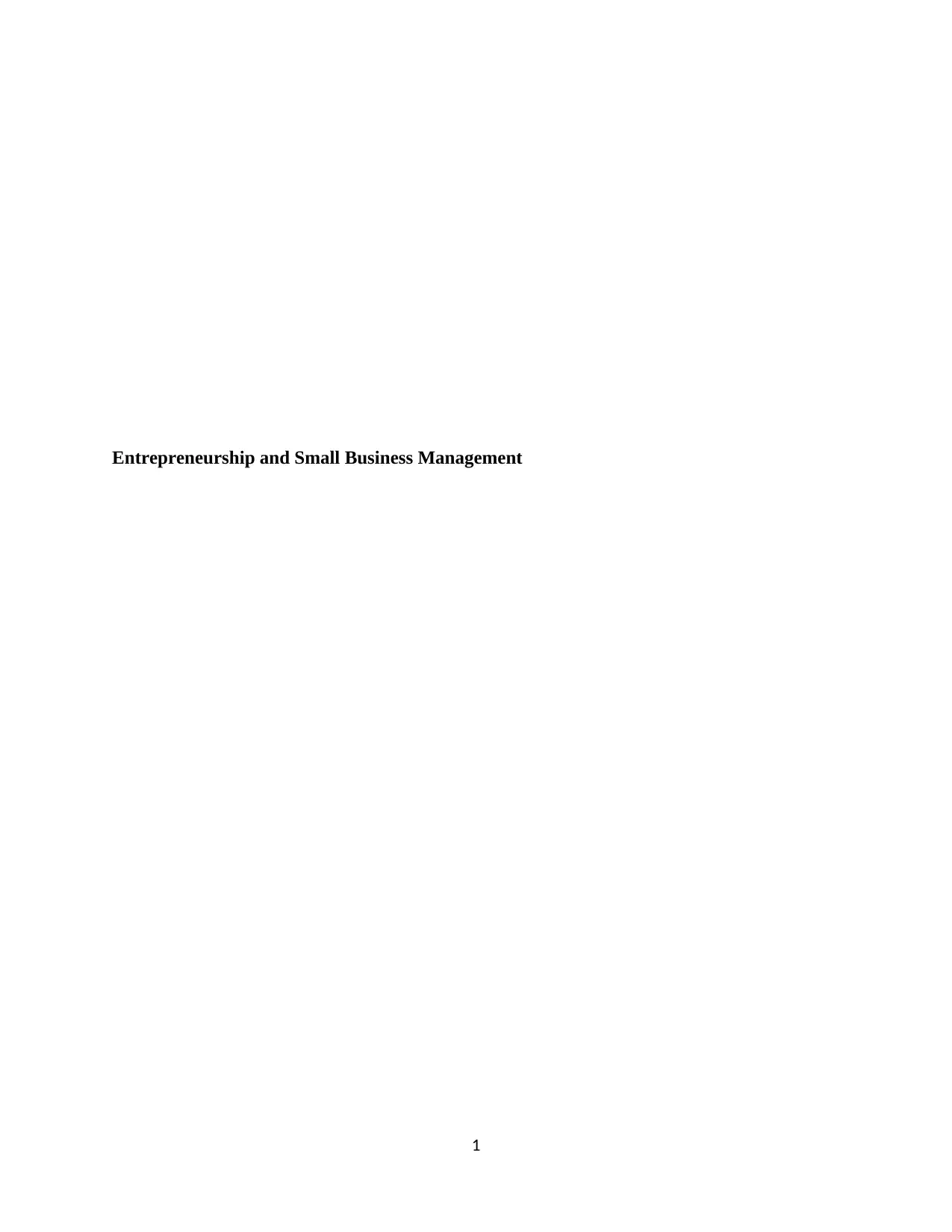
Entrepreneurship and Small Business Management
1
1
Paraphrase This Document
Need a fresh take? Get an instant paraphrase of this document with our AI Paraphraser
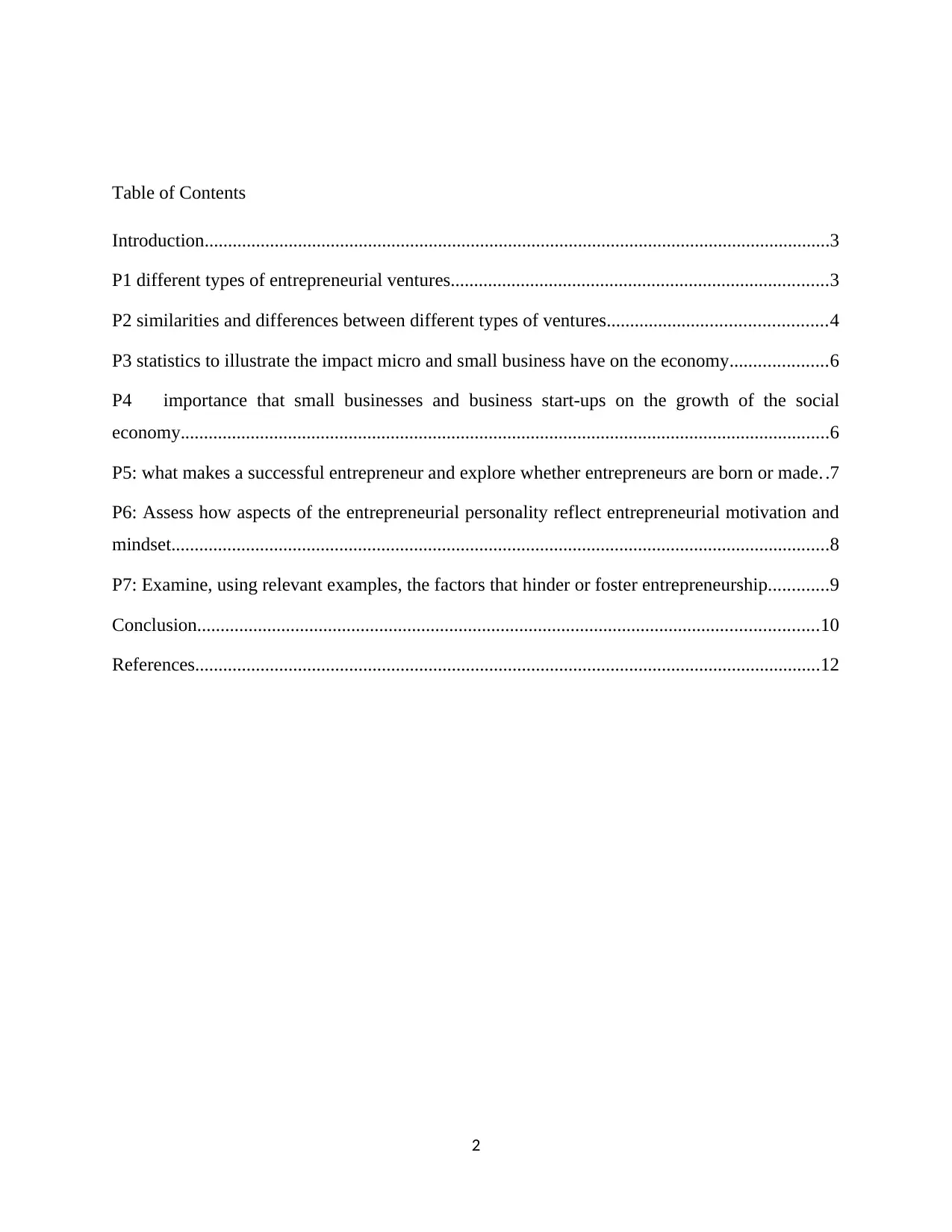
Table of Contents
Introduction......................................................................................................................................3
P1 different types of entrepreneurial ventures.................................................................................3
P2 similarities and differences between different types of ventures...............................................4
P3 statistics to illustrate the impact micro and small business have on the economy.....................6
P4 importance that small businesses and business start-ups on the growth of the social
economy...........................................................................................................................................6
P5: what makes a successful entrepreneur and explore whether entrepreneurs are born or made. .7
P6: Assess how aspects of the entrepreneurial personality reflect entrepreneurial motivation and
mindset.............................................................................................................................................8
P7: Examine, using relevant examples, the factors that hinder or foster entrepreneurship.............9
Conclusion.....................................................................................................................................10
References......................................................................................................................................12
2
Introduction......................................................................................................................................3
P1 different types of entrepreneurial ventures.................................................................................3
P2 similarities and differences between different types of ventures...............................................4
P3 statistics to illustrate the impact micro and small business have on the economy.....................6
P4 importance that small businesses and business start-ups on the growth of the social
economy...........................................................................................................................................6
P5: what makes a successful entrepreneur and explore whether entrepreneurs are born or made. .7
P6: Assess how aspects of the entrepreneurial personality reflect entrepreneurial motivation and
mindset.............................................................................................................................................8
P7: Examine, using relevant examples, the factors that hinder or foster entrepreneurship.............9
Conclusion.....................................................................................................................................10
References......................................................................................................................................12
2
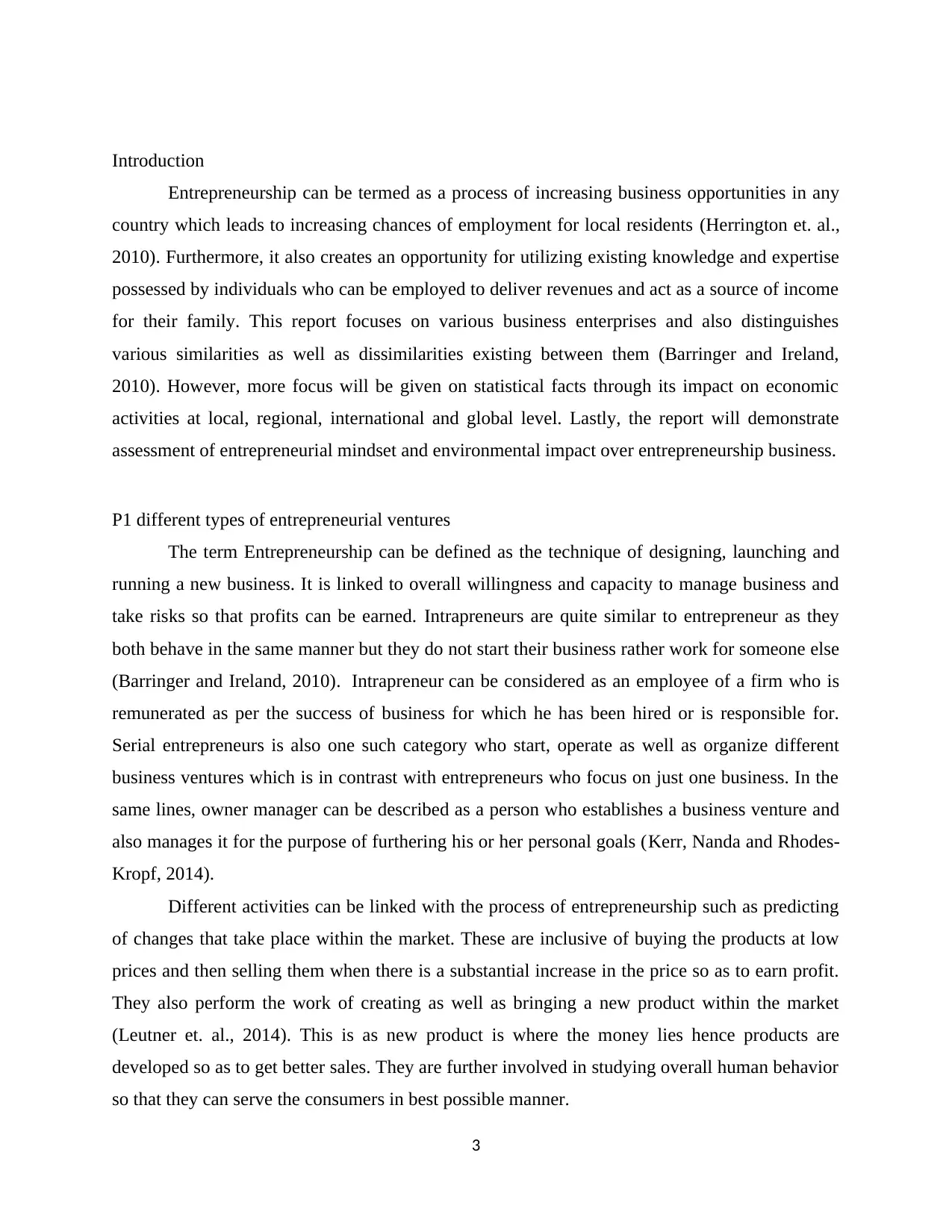
Introduction
Entrepreneurship can be termed as a process of increasing business opportunities in any
country which leads to increasing chances of employment for local residents (Herrington et. al.,
2010). Furthermore, it also creates an opportunity for utilizing existing knowledge and expertise
possessed by individuals who can be employed to deliver revenues and act as a source of income
for their family. This report focuses on various business enterprises and also distinguishes
various similarities as well as dissimilarities existing between them (Barringer and Ireland,
2010). However, more focus will be given on statistical facts through its impact on economic
activities at local, regional, international and global level. Lastly, the report will demonstrate
assessment of entrepreneurial mindset and environmental impact over entrepreneurship business.
P1 different types of entrepreneurial ventures
The term Entrepreneurship can be defined as the technique of designing, launching and
running a new business. It is linked to overall willingness and capacity to manage business and
take risks so that profits can be earned. Intrapreneurs are quite similar to entrepreneur as they
both behave in the same manner but they do not start their business rather work for someone else
(Barringer and Ireland, 2010). Intrapreneur can be considered as an employee of a firm who is
remunerated as per the success of business for which he has been hired or is responsible for.
Serial entrepreneurs is also one such category who start, operate as well as organize different
business ventures which is in contrast with entrepreneurs who focus on just one business. In the
same lines, owner manager can be described as a person who establishes a business venture and
also manages it for the purpose of furthering his or her personal goals (Kerr, Nanda and Rhodes-
Kropf, 2014).
Different activities can be linked with the process of entrepreneurship such as predicting
of changes that take place within the market. These are inclusive of buying the products at low
prices and then selling them when there is a substantial increase in the price so as to earn profit.
They also perform the work of creating as well as bringing a new product within the market
(Leutner et. al., 2014). This is as new product is where the money lies hence products are
developed so as to get better sales. They are further involved in studying overall human behavior
so that they can serve the consumers in best possible manner.
3
Entrepreneurship can be termed as a process of increasing business opportunities in any
country which leads to increasing chances of employment for local residents (Herrington et. al.,
2010). Furthermore, it also creates an opportunity for utilizing existing knowledge and expertise
possessed by individuals who can be employed to deliver revenues and act as a source of income
for their family. This report focuses on various business enterprises and also distinguishes
various similarities as well as dissimilarities existing between them (Barringer and Ireland,
2010). However, more focus will be given on statistical facts through its impact on economic
activities at local, regional, international and global level. Lastly, the report will demonstrate
assessment of entrepreneurial mindset and environmental impact over entrepreneurship business.
P1 different types of entrepreneurial ventures
The term Entrepreneurship can be defined as the technique of designing, launching and
running a new business. It is linked to overall willingness and capacity to manage business and
take risks so that profits can be earned. Intrapreneurs are quite similar to entrepreneur as they
both behave in the same manner but they do not start their business rather work for someone else
(Barringer and Ireland, 2010). Intrapreneur can be considered as an employee of a firm who is
remunerated as per the success of business for which he has been hired or is responsible for.
Serial entrepreneurs is also one such category who start, operate as well as organize different
business ventures which is in contrast with entrepreneurs who focus on just one business. In the
same lines, owner manager can be described as a person who establishes a business venture and
also manages it for the purpose of furthering his or her personal goals (Kerr, Nanda and Rhodes-
Kropf, 2014).
Different activities can be linked with the process of entrepreneurship such as predicting
of changes that take place within the market. These are inclusive of buying the products at low
prices and then selling them when there is a substantial increase in the price so as to earn profit.
They also perform the work of creating as well as bringing a new product within the market
(Leutner et. al., 2014). This is as new product is where the money lies hence products are
developed so as to get better sales. They are further involved in studying overall human behavior
so that they can serve the consumers in best possible manner.
3
⊘ This is a preview!⊘
Do you want full access?
Subscribe today to unlock all pages.

Trusted by 1+ million students worldwide
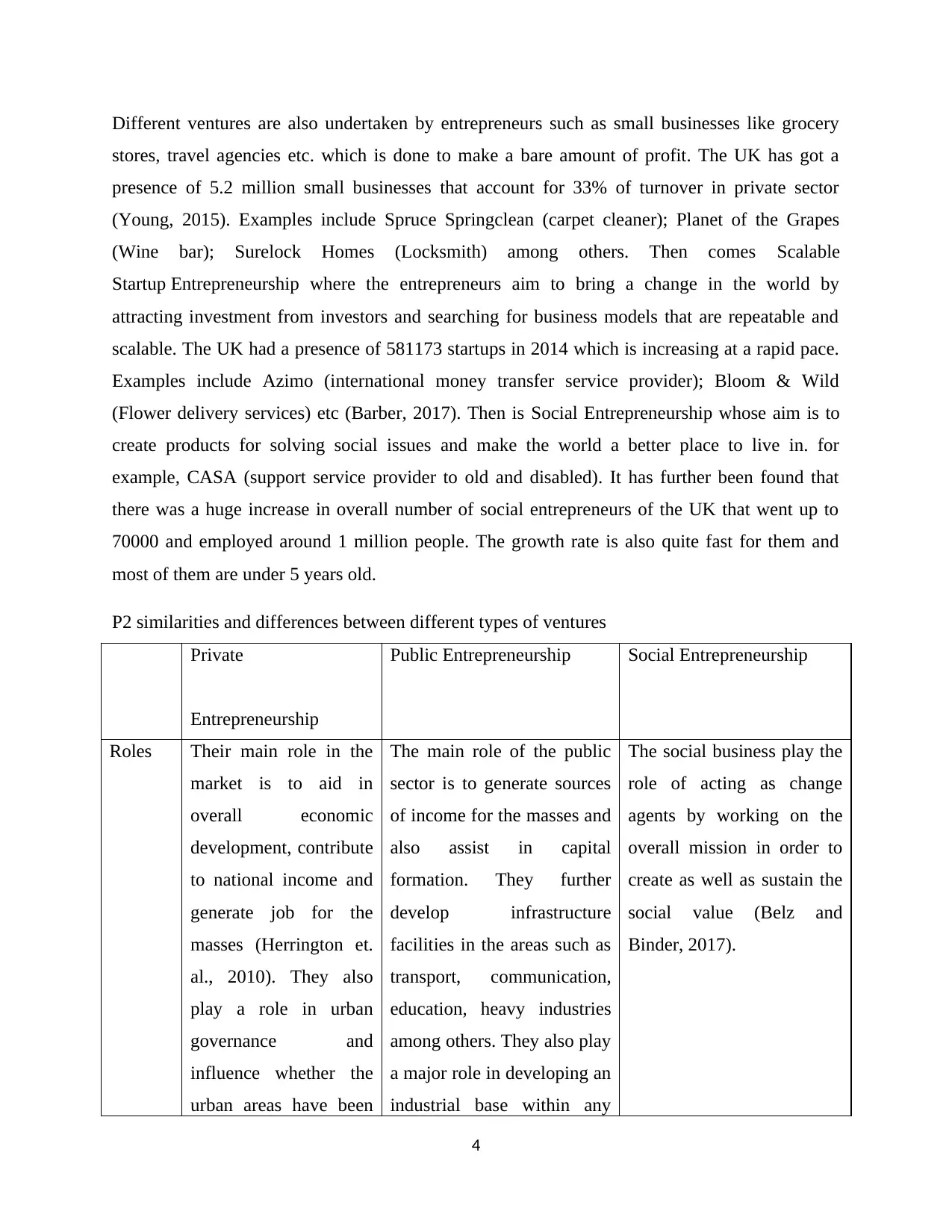
Different ventures are also undertaken by entrepreneurs such as small businesses like grocery
stores, travel agencies etc. which is done to make a bare amount of profit. The UK has got a
presence of 5.2 million small businesses that account for 33% of turnover in private sector
(Young, 2015). Examples include Spruce Springclean (carpet cleaner); Planet of the Grapes
(Wine bar); Surelock Homes (Locksmith) among others. Then comes Scalable
Startup Entrepreneurship where the entrepreneurs aim to bring a change in the world by
attracting investment from investors and searching for business models that are repeatable and
scalable. The UK had a presence of 581173 startups in 2014 which is increasing at a rapid pace.
Examples include Azimo (international money transfer service provider); Bloom & Wild
(Flower delivery services) etc (Barber, 2017). Then is Social Entrepreneurship whose aim is to
create products for solving social issues and make the world a better place to live in. for
example, CASA (support service provider to old and disabled). It has further been found that
there was a huge increase in overall number of social entrepreneurs of the UK that went up to
70000 and employed around 1 million people. The growth rate is also quite fast for them and
most of them are under 5 years old.
P2 similarities and differences between different types of ventures
Private
Entrepreneurship
Public Entrepreneurship Social Entrepreneurship
Roles Their main role in the
market is to aid in
overall economic
development, contribute
to national income and
generate job for the
masses (Herrington et.
al., 2010). They also
play a role in urban
governance and
influence whether the
urban areas have been
The main role of the public
sector is to generate sources
of income for the masses and
also assist in capital
formation. They further
develop infrastructure
facilities in the areas such as
transport, communication,
education, heavy industries
among others. They also play
a major role in developing an
industrial base within any
The social business play the
role of acting as change
agents by working on the
overall mission in order to
create as well as sustain the
social value (Belz and
Binder, 2017).
4
stores, travel agencies etc. which is done to make a bare amount of profit. The UK has got a
presence of 5.2 million small businesses that account for 33% of turnover in private sector
(Young, 2015). Examples include Spruce Springclean (carpet cleaner); Planet of the Grapes
(Wine bar); Surelock Homes (Locksmith) among others. Then comes Scalable
Startup Entrepreneurship where the entrepreneurs aim to bring a change in the world by
attracting investment from investors and searching for business models that are repeatable and
scalable. The UK had a presence of 581173 startups in 2014 which is increasing at a rapid pace.
Examples include Azimo (international money transfer service provider); Bloom & Wild
(Flower delivery services) etc (Barber, 2017). Then is Social Entrepreneurship whose aim is to
create products for solving social issues and make the world a better place to live in. for
example, CASA (support service provider to old and disabled). It has further been found that
there was a huge increase in overall number of social entrepreneurs of the UK that went up to
70000 and employed around 1 million people. The growth rate is also quite fast for them and
most of them are under 5 years old.
P2 similarities and differences between different types of ventures
Private
Entrepreneurship
Public Entrepreneurship Social Entrepreneurship
Roles Their main role in the
market is to aid in
overall economic
development, contribute
to national income and
generate job for the
masses (Herrington et.
al., 2010). They also
play a role in urban
governance and
influence whether the
urban areas have been
The main role of the public
sector is to generate sources
of income for the masses and
also assist in capital
formation. They further
develop infrastructure
facilities in the areas such as
transport, communication,
education, heavy industries
among others. They also play
a major role in developing an
industrial base within any
The social business play the
role of acting as change
agents by working on the
overall mission in order to
create as well as sustain the
social value (Belz and
Binder, 2017).
4
Paraphrase This Document
Need a fresh take? Get an instant paraphrase of this document with our AI Paraphraser

developed in a
sustainable manner or
not (Zhang, Duysters
and Cloodt, 2014).
They further aid in
bringing an overall
reduction in poverty as
well as conflicting
situations like
instability and
exclusion.
nation (Barringer and
Ireland, 2010).
Charact
eristics
These businesses are
owned as well as
controlled by single or a
group of individuals
These may be large or
small in size.
These businesses are the
ones that are under the
control of government be it
in central, state or local
region (Aparicio, Urbano and
Audretsch, 2016).
These are usually large in
size
These businesses may or
may not have a presence of
independent ownership and
operation.
The businesses are large or
small in terms of overall
size.
These wish to attain growth
by providing a benefit to the
communities and focus on
novel opportunities in order
to serve the formulated
mission.
These have a presence of
innovative, adaptable as
well as learning feature.
Objecti
ves
The objective of private
business ventures is to
create market in order
The objective of public
business is to serve the
general public and look after
Their role is to serve the
community and bring good
change in it (Barringer and
5
sustainable manner or
not (Zhang, Duysters
and Cloodt, 2014).
They further aid in
bringing an overall
reduction in poverty as
well as conflicting
situations like
instability and
exclusion.
nation (Barringer and
Ireland, 2010).
Charact
eristics
These businesses are
owned as well as
controlled by single or a
group of individuals
These may be large or
small in size.
These businesses are the
ones that are under the
control of government be it
in central, state or local
region (Aparicio, Urbano and
Audretsch, 2016).
These are usually large in
size
These businesses may or
may not have a presence of
independent ownership and
operation.
The businesses are large or
small in terms of overall
size.
These wish to attain growth
by providing a benefit to the
communities and focus on
novel opportunities in order
to serve the formulated
mission.
These have a presence of
innovative, adaptable as
well as learning feature.
Objecti
ves
The objective of private
business ventures is to
create market in order
The objective of public
business is to serve the
general public and look after
Their role is to serve the
community and bring good
change in it (Barringer and
5
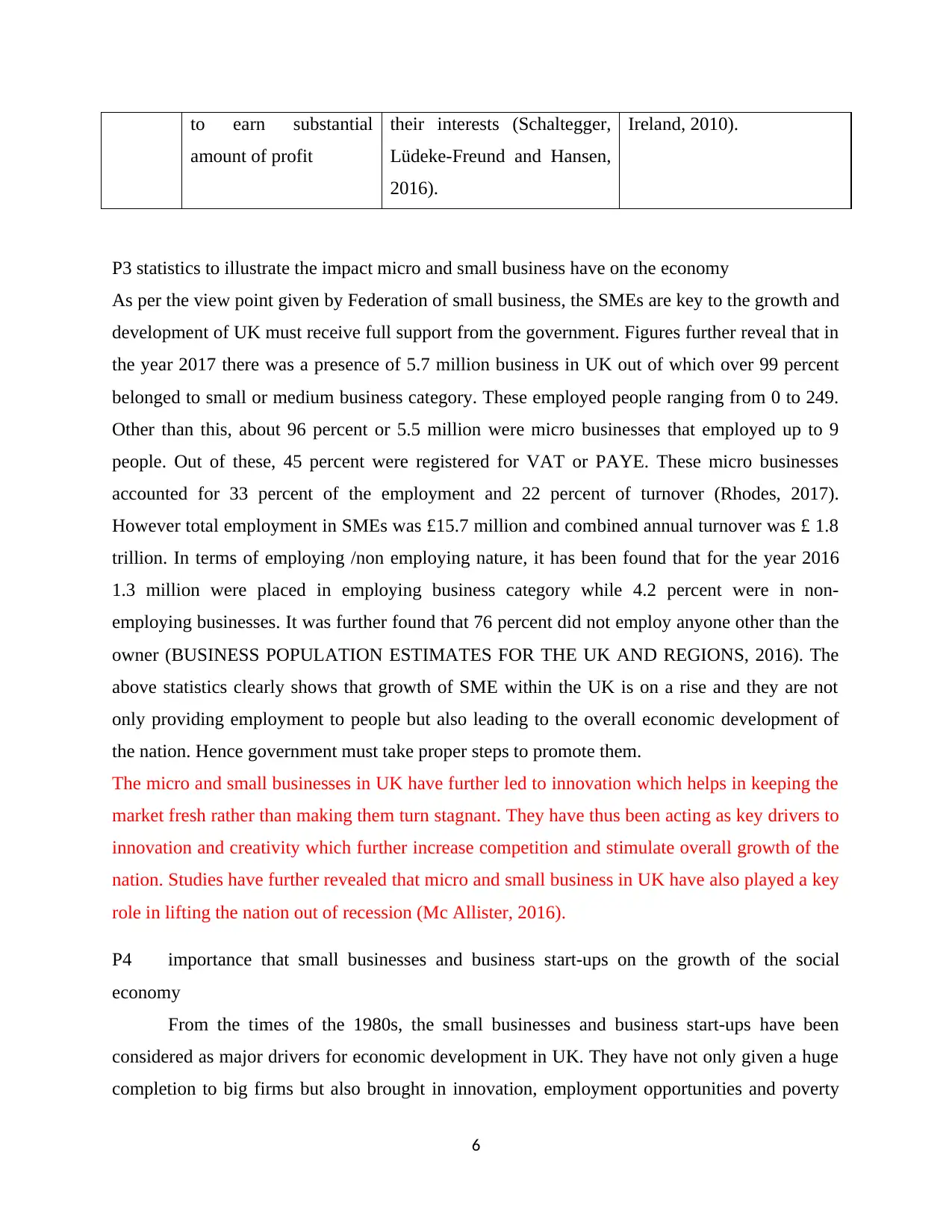
to earn substantial
amount of profit
their interests (Schaltegger,
Lüdeke-Freund and Hansen,
2016).
Ireland, 2010).
P3 statistics to illustrate the impact micro and small business have on the economy
As per the view point given by Federation of small business, the SMEs are key to the growth and
development of UK must receive full support from the government. Figures further reveal that in
the year 2017 there was a presence of 5.7 million business in UK out of which over 99 percent
belonged to small or medium business category. These employed people ranging from 0 to 249.
Other than this, about 96 percent or 5.5 million were micro businesses that employed up to 9
people. Out of these, 45 percent were registered for VAT or PAYE. These micro businesses
accounted for 33 percent of the employment and 22 percent of turnover (Rhodes, 2017).
However total employment in SMEs was £15.7 million and combined annual turnover was £ 1.8
trillion. In terms of employing /non employing nature, it has been found that for the year 2016
1.3 million were placed in employing business category while 4.2 percent were in non-
employing businesses. It was further found that 76 percent did not employ anyone other than the
owner (BUSINESS POPULATION ESTIMATES FOR THE UK AND REGIONS, 2016). The
above statistics clearly shows that growth of SME within the UK is on a rise and they are not
only providing employment to people but also leading to the overall economic development of
the nation. Hence government must take proper steps to promote them.
The micro and small businesses in UK have further led to innovation which helps in keeping the
market fresh rather than making them turn stagnant. They have thus been acting as key drivers to
innovation and creativity which further increase competition and stimulate overall growth of the
nation. Studies have further revealed that micro and small business in UK have also played a key
role in lifting the nation out of recession (Mc Allister, 2016).
P4 importance that small businesses and business start-ups on the growth of the social
economy
From the times of the 1980s, the small businesses and business start-ups have been
considered as major drivers for economic development in UK. They have not only given a huge
completion to big firms but also brought in innovation, employment opportunities and poverty
6
amount of profit
their interests (Schaltegger,
Lüdeke-Freund and Hansen,
2016).
Ireland, 2010).
P3 statistics to illustrate the impact micro and small business have on the economy
As per the view point given by Federation of small business, the SMEs are key to the growth and
development of UK must receive full support from the government. Figures further reveal that in
the year 2017 there was a presence of 5.7 million business in UK out of which over 99 percent
belonged to small or medium business category. These employed people ranging from 0 to 249.
Other than this, about 96 percent or 5.5 million were micro businesses that employed up to 9
people. Out of these, 45 percent were registered for VAT or PAYE. These micro businesses
accounted for 33 percent of the employment and 22 percent of turnover (Rhodes, 2017).
However total employment in SMEs was £15.7 million and combined annual turnover was £ 1.8
trillion. In terms of employing /non employing nature, it has been found that for the year 2016
1.3 million were placed in employing business category while 4.2 percent were in non-
employing businesses. It was further found that 76 percent did not employ anyone other than the
owner (BUSINESS POPULATION ESTIMATES FOR THE UK AND REGIONS, 2016). The
above statistics clearly shows that growth of SME within the UK is on a rise and they are not
only providing employment to people but also leading to the overall economic development of
the nation. Hence government must take proper steps to promote them.
The micro and small businesses in UK have further led to innovation which helps in keeping the
market fresh rather than making them turn stagnant. They have thus been acting as key drivers to
innovation and creativity which further increase competition and stimulate overall growth of the
nation. Studies have further revealed that micro and small business in UK have also played a key
role in lifting the nation out of recession (Mc Allister, 2016).
P4 importance that small businesses and business start-ups on the growth of the social
economy
From the times of the 1980s, the small businesses and business start-ups have been
considered as major drivers for economic development in UK. They have not only given a huge
completion to big firms but also brought in innovation, employment opportunities and poverty
6
⊘ This is a preview!⊘
Do you want full access?
Subscribe today to unlock all pages.

Trusted by 1+ million students worldwide
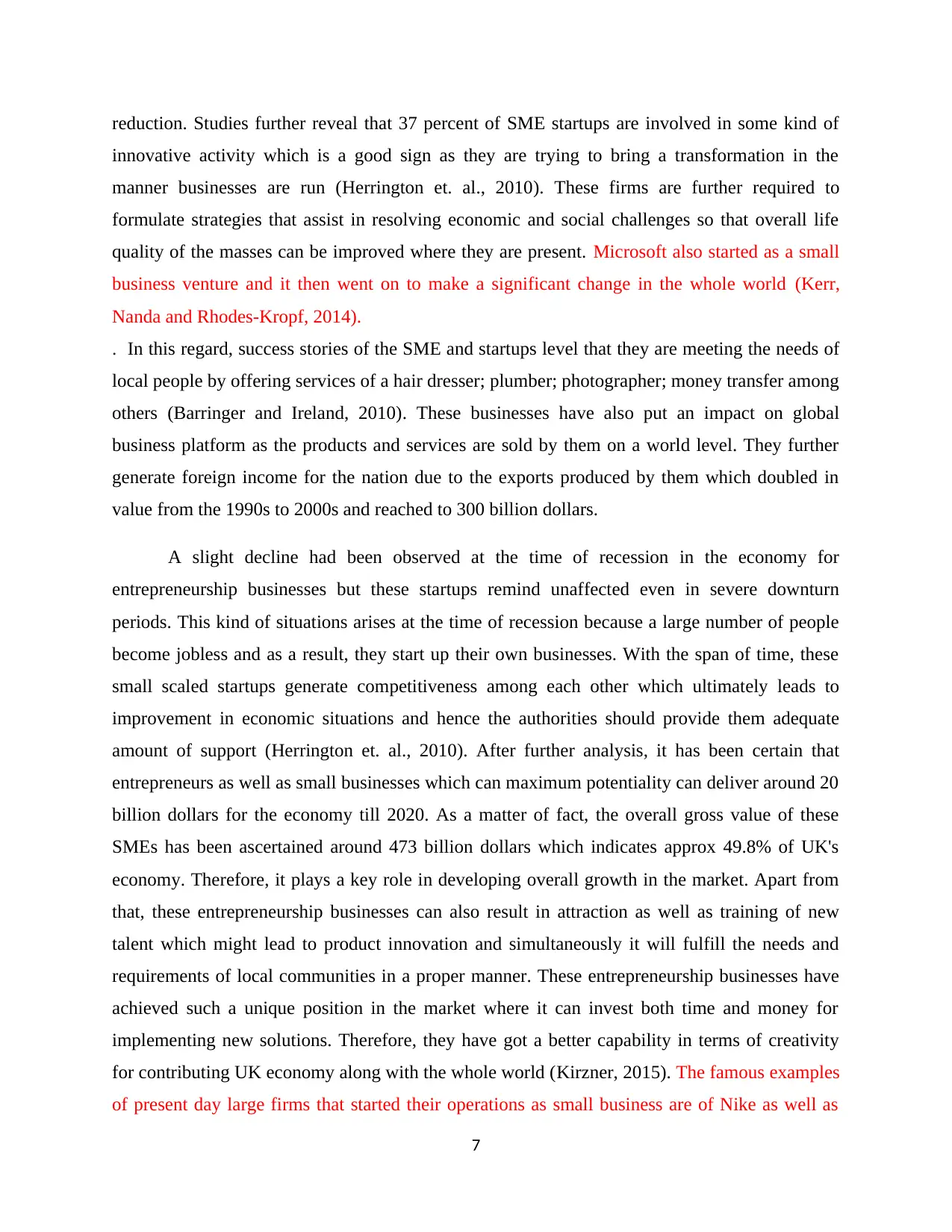
reduction. Studies further reveal that 37 percent of SME startups are involved in some kind of
innovative activity which is a good sign as they are trying to bring a transformation in the
manner businesses are run (Herrington et. al., 2010). These firms are further required to
formulate strategies that assist in resolving economic and social challenges so that overall life
quality of the masses can be improved where they are present. Microsoft also started as a small
business venture and it then went on to make a significant change in the whole world (Kerr,
Nanda and Rhodes-Kropf, 2014).
. In this regard, success stories of the SME and startups level that they are meeting the needs of
local people by offering services of a hair dresser; plumber; photographer; money transfer among
others (Barringer and Ireland, 2010). These businesses have also put an impact on global
business platform as the products and services are sold by them on a world level. They further
generate foreign income for the nation due to the exports produced by them which doubled in
value from the 1990s to 2000s and reached to 300 billion dollars.
A slight decline had been observed at the time of recession in the economy for
entrepreneurship businesses but these startups remind unaffected even in severe downturn
periods. This kind of situations arises at the time of recession because a large number of people
become jobless and as a result, they start up their own businesses. With the span of time, these
small scaled startups generate competitiveness among each other which ultimately leads to
improvement in economic situations and hence the authorities should provide them adequate
amount of support (Herrington et. al., 2010). After further analysis, it has been certain that
entrepreneurs as well as small businesses which can maximum potentiality can deliver around 20
billion dollars for the economy till 2020. As a matter of fact, the overall gross value of these
SMEs has been ascertained around 473 billion dollars which indicates approx 49.8% of UK's
economy. Therefore, it plays a key role in developing overall growth in the market. Apart from
that, these entrepreneurship businesses can also result in attraction as well as training of new
talent which might lead to product innovation and simultaneously it will fulfill the needs and
requirements of local communities in a proper manner. These entrepreneurship businesses have
achieved such a unique position in the market where it can invest both time and money for
implementing new solutions. Therefore, they have got a better capability in terms of creativity
for contributing UK economy along with the whole world (Kirzner, 2015). The famous examples
of present day large firms that started their operations as small business are of Nike as well as
7
innovative activity which is a good sign as they are trying to bring a transformation in the
manner businesses are run (Herrington et. al., 2010). These firms are further required to
formulate strategies that assist in resolving economic and social challenges so that overall life
quality of the masses can be improved where they are present. Microsoft also started as a small
business venture and it then went on to make a significant change in the whole world (Kerr,
Nanda and Rhodes-Kropf, 2014).
. In this regard, success stories of the SME and startups level that they are meeting the needs of
local people by offering services of a hair dresser; plumber; photographer; money transfer among
others (Barringer and Ireland, 2010). These businesses have also put an impact on global
business platform as the products and services are sold by them on a world level. They further
generate foreign income for the nation due to the exports produced by them which doubled in
value from the 1990s to 2000s and reached to 300 billion dollars.
A slight decline had been observed at the time of recession in the economy for
entrepreneurship businesses but these startups remind unaffected even in severe downturn
periods. This kind of situations arises at the time of recession because a large number of people
become jobless and as a result, they start up their own businesses. With the span of time, these
small scaled startups generate competitiveness among each other which ultimately leads to
improvement in economic situations and hence the authorities should provide them adequate
amount of support (Herrington et. al., 2010). After further analysis, it has been certain that
entrepreneurs as well as small businesses which can maximum potentiality can deliver around 20
billion dollars for the economy till 2020. As a matter of fact, the overall gross value of these
SMEs has been ascertained around 473 billion dollars which indicates approx 49.8% of UK's
economy. Therefore, it plays a key role in developing overall growth in the market. Apart from
that, these entrepreneurship businesses can also result in attraction as well as training of new
talent which might lead to product innovation and simultaneously it will fulfill the needs and
requirements of local communities in a proper manner. These entrepreneurship businesses have
achieved such a unique position in the market where it can invest both time and money for
implementing new solutions. Therefore, they have got a better capability in terms of creativity
for contributing UK economy along with the whole world (Kirzner, 2015). The famous examples
of present day large firms that started their operations as small business are of Nike as well as
7
Paraphrase This Document
Need a fresh take? Get an instant paraphrase of this document with our AI Paraphraser
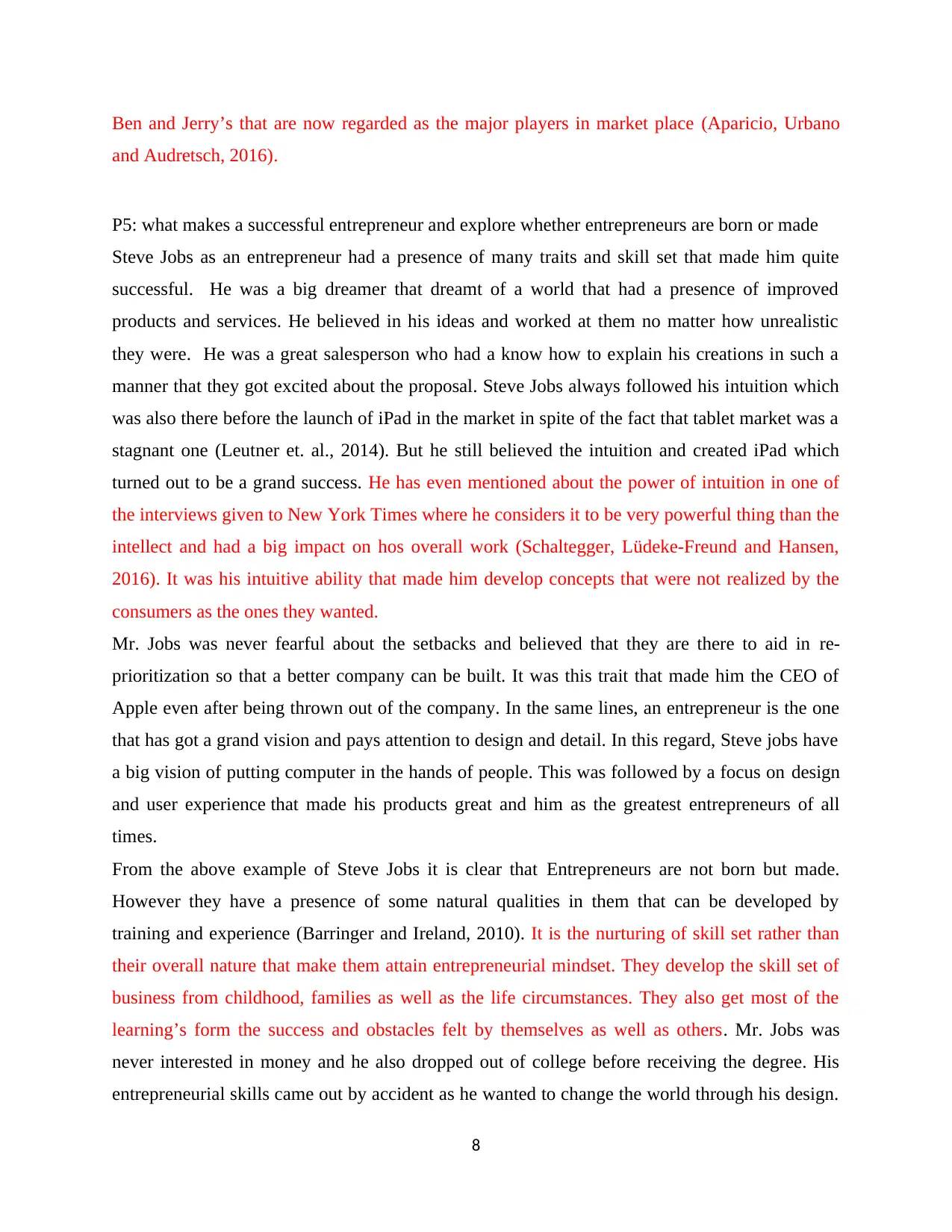
Ben and Jerry’s that are now regarded as the major players in market place (Aparicio, Urbano
and Audretsch, 2016).
P5: what makes a successful entrepreneur and explore whether entrepreneurs are born or made
Steve Jobs as an entrepreneur had a presence of many traits and skill set that made him quite
successful. He was a big dreamer that dreamt of a world that had a presence of improved
products and services. He believed in his ideas and worked at them no matter how unrealistic
they were. He was a great salesperson who had a know how to explain his creations in such a
manner that they got excited about the proposal. Steve Jobs always followed his intuition which
was also there before the launch of iPad in the market in spite of the fact that tablet market was a
stagnant one (Leutner et. al., 2014). But he still believed the intuition and created iPad which
turned out to be a grand success. He has even mentioned about the power of intuition in one of
the interviews given to New York Times where he considers it to be very powerful thing than the
intellect and had a big impact on hos overall work (Schaltegger, Lüdeke-Freund and Hansen,
2016). It was his intuitive ability that made him develop concepts that were not realized by the
consumers as the ones they wanted.
Mr. Jobs was never fearful about the setbacks and believed that they are there to aid in re-
prioritization so that a better company can be built. It was this trait that made him the CEO of
Apple even after being thrown out of the company. In the same lines, an entrepreneur is the one
that has got a grand vision and pays attention to design and detail. In this regard, Steve jobs have
a big vision of putting computer in the hands of people. This was followed by a focus on design
and user experience that made his products great and him as the greatest entrepreneurs of all
times.
From the above example of Steve Jobs it is clear that Entrepreneurs are not born but made.
However they have a presence of some natural qualities in them that can be developed by
training and experience (Barringer and Ireland, 2010). It is the nurturing of skill set rather than
their overall nature that make them attain entrepreneurial mindset. They develop the skill set of
business from childhood, families as well as the life circumstances. They also get most of the
learning’s form the success and obstacles felt by themselves as well as others. Mr. Jobs was
never interested in money and he also dropped out of college before receiving the degree. His
entrepreneurial skills came out by accident as he wanted to change the world through his design.
8
and Audretsch, 2016).
P5: what makes a successful entrepreneur and explore whether entrepreneurs are born or made
Steve Jobs as an entrepreneur had a presence of many traits and skill set that made him quite
successful. He was a big dreamer that dreamt of a world that had a presence of improved
products and services. He believed in his ideas and worked at them no matter how unrealistic
they were. He was a great salesperson who had a know how to explain his creations in such a
manner that they got excited about the proposal. Steve Jobs always followed his intuition which
was also there before the launch of iPad in the market in spite of the fact that tablet market was a
stagnant one (Leutner et. al., 2014). But he still believed the intuition and created iPad which
turned out to be a grand success. He has even mentioned about the power of intuition in one of
the interviews given to New York Times where he considers it to be very powerful thing than the
intellect and had a big impact on hos overall work (Schaltegger, Lüdeke-Freund and Hansen,
2016). It was his intuitive ability that made him develop concepts that were not realized by the
consumers as the ones they wanted.
Mr. Jobs was never fearful about the setbacks and believed that they are there to aid in re-
prioritization so that a better company can be built. It was this trait that made him the CEO of
Apple even after being thrown out of the company. In the same lines, an entrepreneur is the one
that has got a grand vision and pays attention to design and detail. In this regard, Steve jobs have
a big vision of putting computer in the hands of people. This was followed by a focus on design
and user experience that made his products great and him as the greatest entrepreneurs of all
times.
From the above example of Steve Jobs it is clear that Entrepreneurs are not born but made.
However they have a presence of some natural qualities in them that can be developed by
training and experience (Barringer and Ireland, 2010). It is the nurturing of skill set rather than
their overall nature that make them attain entrepreneurial mindset. They develop the skill set of
business from childhood, families as well as the life circumstances. They also get most of the
learning’s form the success and obstacles felt by themselves as well as others. Mr. Jobs was
never interested in money and he also dropped out of college before receiving the degree. His
entrepreneurial skills came out by accident as he wanted to change the world through his design.
8
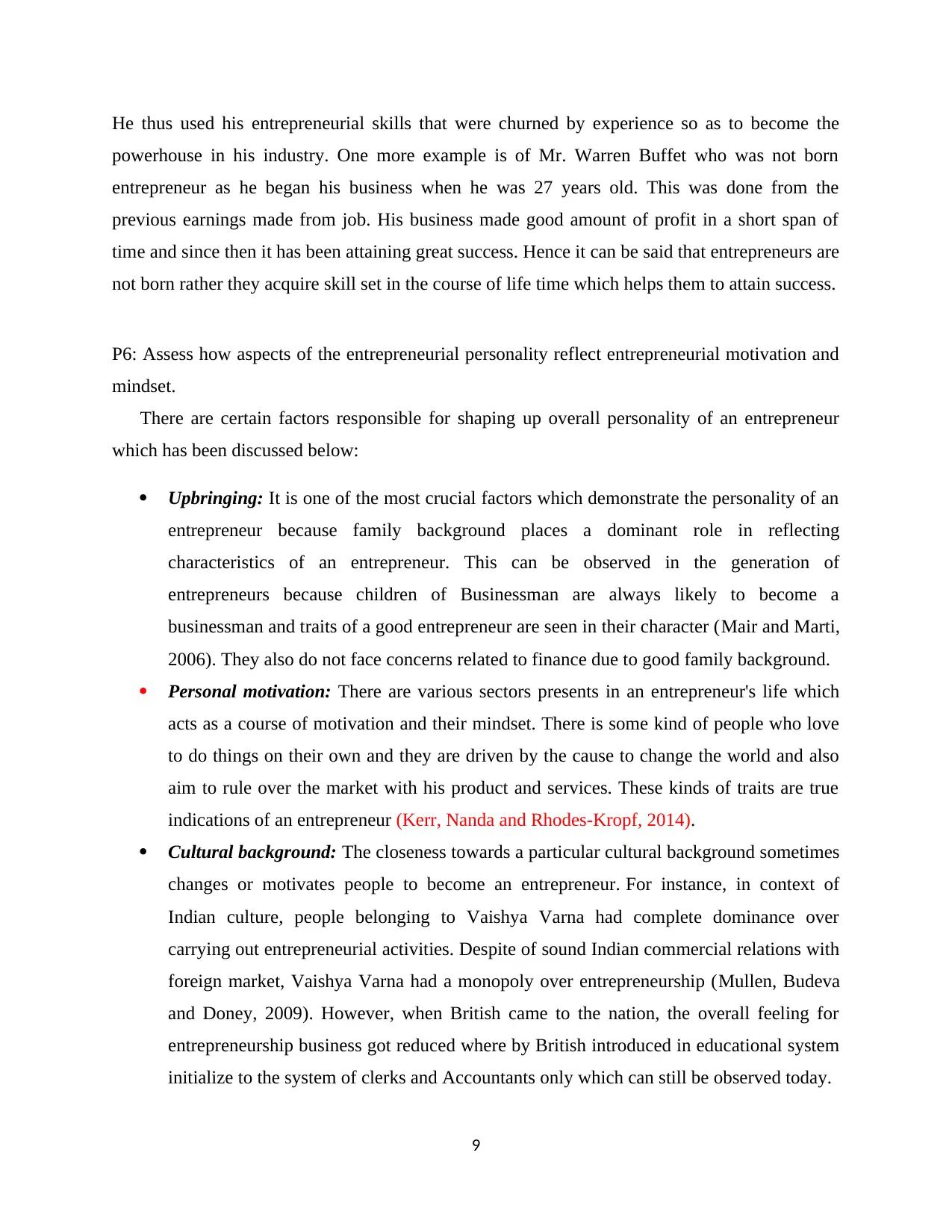
He thus used his entrepreneurial skills that were churned by experience so as to become the
powerhouse in his industry. One more example is of Mr. Warren Buffet who was not born
entrepreneur as he began his business when he was 27 years old. This was done from the
previous earnings made from job. His business made good amount of profit in a short span of
time and since then it has been attaining great success. Hence it can be said that entrepreneurs are
not born rather they acquire skill set in the course of life time which helps them to attain success.
P6: Assess how aspects of the entrepreneurial personality reflect entrepreneurial motivation and
mindset.
There are certain factors responsible for shaping up overall personality of an entrepreneur
which has been discussed below:
Upbringing: It is one of the most crucial factors which demonstrate the personality of an
entrepreneur because family background places a dominant role in reflecting
characteristics of an entrepreneur. This can be observed in the generation of
entrepreneurs because children of Businessman are always likely to become a
businessman and traits of a good entrepreneur are seen in their character (Mair and Marti,
2006). They also do not face concerns related to finance due to good family background.
Personal motivation: There are various sectors presents in an entrepreneur's life which
acts as a course of motivation and their mindset. There is some kind of people who love
to do things on their own and they are driven by the cause to change the world and also
aim to rule over the market with his product and services. These kinds of traits are true
indications of an entrepreneur (Kerr, Nanda and Rhodes-Kropf, 2014).
Cultural background: The closeness towards a particular cultural background sometimes
changes or motivates people to become an entrepreneur. For instance, in context of
Indian culture, people belonging to Vaishya Varna had complete dominance over
carrying out entrepreneurial activities. Despite of sound Indian commercial relations with
foreign market, Vaishya Varna had a monopoly over entrepreneurship (Mullen, Budeva
and Doney, 2009). However, when British came to the nation, the overall feeling for
entrepreneurship business got reduced where by British introduced in educational system
initialize to the system of clerks and Accountants only which can still be observed today.
9
powerhouse in his industry. One more example is of Mr. Warren Buffet who was not born
entrepreneur as he began his business when he was 27 years old. This was done from the
previous earnings made from job. His business made good amount of profit in a short span of
time and since then it has been attaining great success. Hence it can be said that entrepreneurs are
not born rather they acquire skill set in the course of life time which helps them to attain success.
P6: Assess how aspects of the entrepreneurial personality reflect entrepreneurial motivation and
mindset.
There are certain factors responsible for shaping up overall personality of an entrepreneur
which has been discussed below:
Upbringing: It is one of the most crucial factors which demonstrate the personality of an
entrepreneur because family background places a dominant role in reflecting
characteristics of an entrepreneur. This can be observed in the generation of
entrepreneurs because children of Businessman are always likely to become a
businessman and traits of a good entrepreneur are seen in their character (Mair and Marti,
2006). They also do not face concerns related to finance due to good family background.
Personal motivation: There are various sectors presents in an entrepreneur's life which
acts as a course of motivation and their mindset. There is some kind of people who love
to do things on their own and they are driven by the cause to change the world and also
aim to rule over the market with his product and services. These kinds of traits are true
indications of an entrepreneur (Kerr, Nanda and Rhodes-Kropf, 2014).
Cultural background: The closeness towards a particular cultural background sometimes
changes or motivates people to become an entrepreneur. For instance, in context of
Indian culture, people belonging to Vaishya Varna had complete dominance over
carrying out entrepreneurial activities. Despite of sound Indian commercial relations with
foreign market, Vaishya Varna had a monopoly over entrepreneurship (Mullen, Budeva
and Doney, 2009). However, when British came to the nation, the overall feeling for
entrepreneurship business got reduced where by British introduced in educational system
initialize to the system of clerks and Accountants only which can still be observed today.
9
⊘ This is a preview!⊘
Do you want full access?
Subscribe today to unlock all pages.

Trusted by 1+ million students worldwide
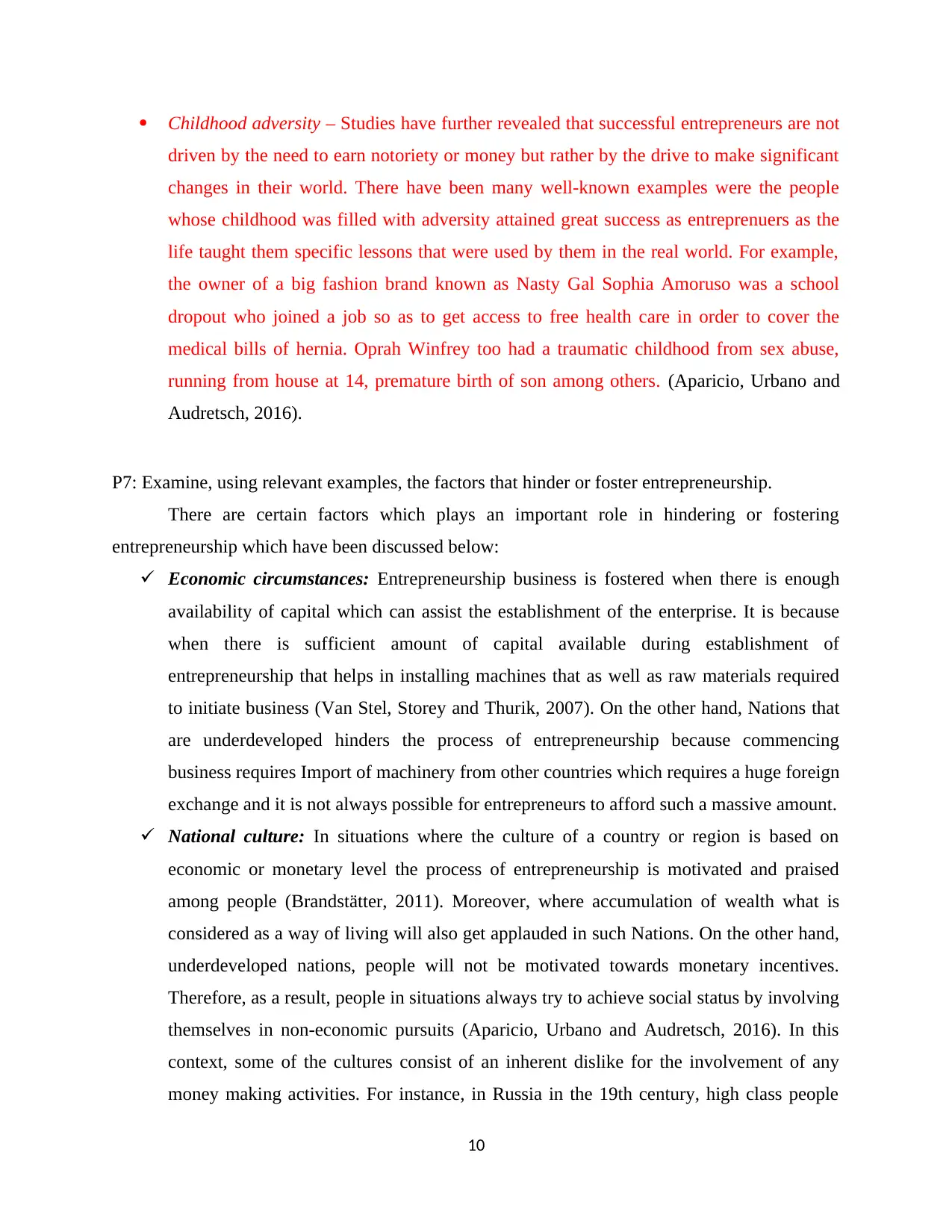
Childhood adversity – Studies have further revealed that successful entrepreneurs are not
driven by the need to earn notoriety or money but rather by the drive to make significant
changes in their world. There have been many well-known examples were the people
whose childhood was filled with adversity attained great success as entreprenuers as the
life taught them specific lessons that were used by them in the real world. For example,
the owner of a big fashion brand known as Nasty Gal Sophia Amoruso was a school
dropout who joined a job so as to get access to free health care in order to cover the
medical bills of hernia. Oprah Winfrey too had a traumatic childhood from sex abuse,
running from house at 14, premature birth of son among others. (Aparicio, Urbano and
Audretsch, 2016).
P7: Examine, using relevant examples, the factors that hinder or foster entrepreneurship.
There are certain factors which plays an important role in hindering or fostering
entrepreneurship which have been discussed below:
Economic circumstances: Entrepreneurship business is fostered when there is enough
availability of capital which can assist the establishment of the enterprise. It is because
when there is sufficient amount of capital available during establishment of
entrepreneurship that helps in installing machines that as well as raw materials required
to initiate business (Van Stel, Storey and Thurik, 2007). On the other hand, Nations that
are underdeveloped hinders the process of entrepreneurship because commencing
business requires Import of machinery from other countries which requires a huge foreign
exchange and it is not always possible for entrepreneurs to afford such a massive amount.
National culture: In situations where the culture of a country or region is based on
economic or monetary level the process of entrepreneurship is motivated and praised
among people (Brandstätter, 2011). Moreover, where accumulation of wealth what is
considered as a way of living will also get applauded in such Nations. On the other hand,
underdeveloped nations, people will not be motivated towards monetary incentives.
Therefore, as a result, people in situations always try to achieve social status by involving
themselves in non-economic pursuits (Aparicio, Urbano and Audretsch, 2016). In this
context, some of the cultures consist of an inherent dislike for the involvement of any
money making activities. For instance, in Russia in the 19th century, high class people
10
driven by the need to earn notoriety or money but rather by the drive to make significant
changes in their world. There have been many well-known examples were the people
whose childhood was filled with adversity attained great success as entreprenuers as the
life taught them specific lessons that were used by them in the real world. For example,
the owner of a big fashion brand known as Nasty Gal Sophia Amoruso was a school
dropout who joined a job so as to get access to free health care in order to cover the
medical bills of hernia. Oprah Winfrey too had a traumatic childhood from sex abuse,
running from house at 14, premature birth of son among others. (Aparicio, Urbano and
Audretsch, 2016).
P7: Examine, using relevant examples, the factors that hinder or foster entrepreneurship.
There are certain factors which plays an important role in hindering or fostering
entrepreneurship which have been discussed below:
Economic circumstances: Entrepreneurship business is fostered when there is enough
availability of capital which can assist the establishment of the enterprise. It is because
when there is sufficient amount of capital available during establishment of
entrepreneurship that helps in installing machines that as well as raw materials required
to initiate business (Van Stel, Storey and Thurik, 2007). On the other hand, Nations that
are underdeveloped hinders the process of entrepreneurship because commencing
business requires Import of machinery from other countries which requires a huge foreign
exchange and it is not always possible for entrepreneurs to afford such a massive amount.
National culture: In situations where the culture of a country or region is based on
economic or monetary level the process of entrepreneurship is motivated and praised
among people (Brandstätter, 2011). Moreover, where accumulation of wealth what is
considered as a way of living will also get applauded in such Nations. On the other hand,
underdeveloped nations, people will not be motivated towards monetary incentives.
Therefore, as a result, people in situations always try to achieve social status by involving
themselves in non-economic pursuits (Aparicio, Urbano and Audretsch, 2016). In this
context, some of the cultures consist of an inherent dislike for the involvement of any
money making activities. For instance, in Russia in the 19th century, high class people
10
Paraphrase This Document
Need a fresh take? Get an instant paraphrase of this document with our AI Paraphraser
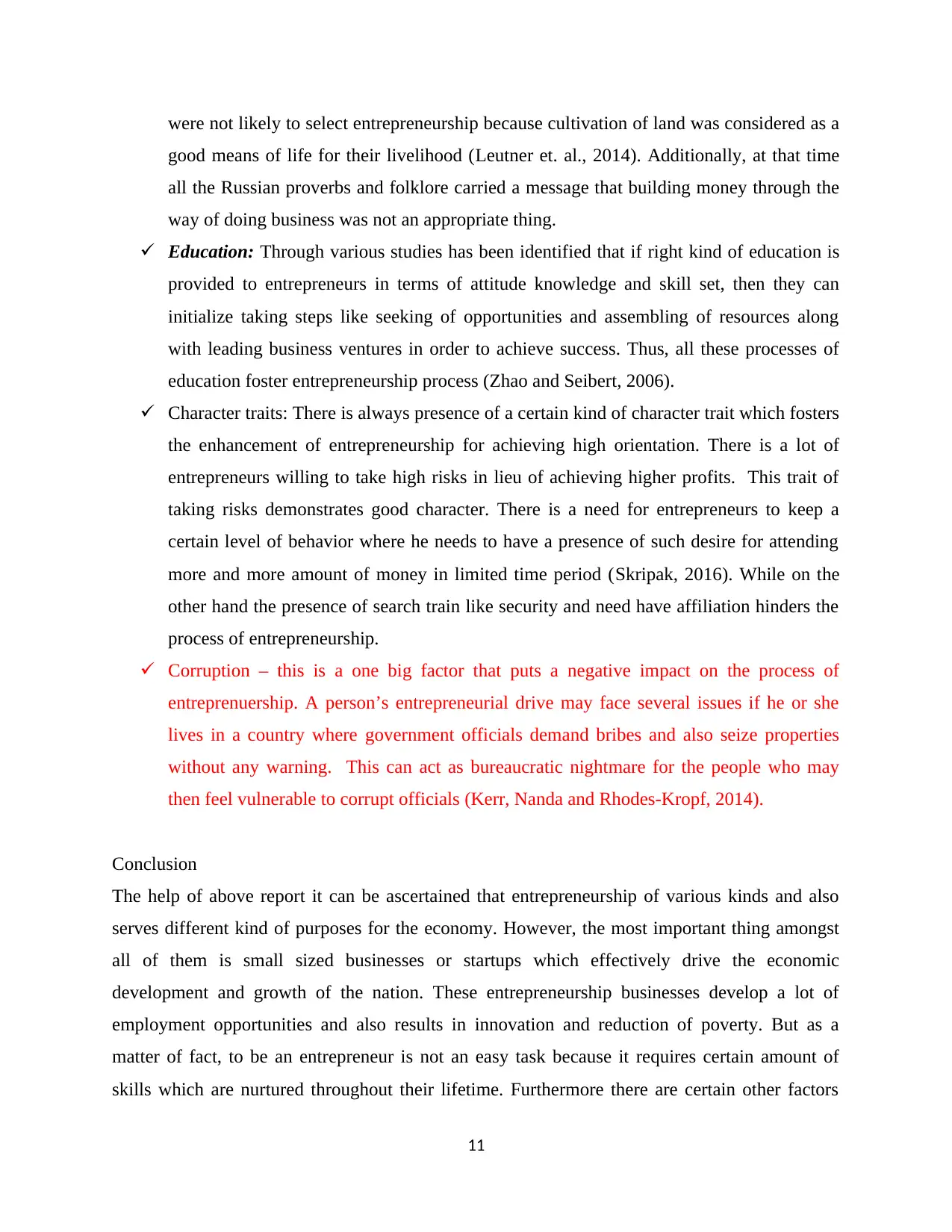
were not likely to select entrepreneurship because cultivation of land was considered as a
good means of life for their livelihood (Leutner et. al., 2014). Additionally, at that time
all the Russian proverbs and folklore carried a message that building money through the
way of doing business was not an appropriate thing.
Education: Through various studies has been identified that if right kind of education is
provided to entrepreneurs in terms of attitude knowledge and skill set, then they can
initialize taking steps like seeking of opportunities and assembling of resources along
with leading business ventures in order to achieve success. Thus, all these processes of
education foster entrepreneurship process (Zhao and Seibert, 2006).
Character traits: There is always presence of a certain kind of character trait which fosters
the enhancement of entrepreneurship for achieving high orientation. There is a lot of
entrepreneurs willing to take high risks in lieu of achieving higher profits. This trait of
taking risks demonstrates good character. There is a need for entrepreneurs to keep a
certain level of behavior where he needs to have a presence of such desire for attending
more and more amount of money in limited time period (Skripak, 2016). While on the
other hand the presence of search train like security and need have affiliation hinders the
process of entrepreneurship.
Corruption – this is a one big factor that puts a negative impact on the process of
entreprenuership. A person’s entrepreneurial drive may face several issues if he or she
lives in a country where government officials demand bribes and also seize properties
without any warning. This can act as bureaucratic nightmare for the people who may
then feel vulnerable to corrupt officials (Kerr, Nanda and Rhodes-Kropf, 2014).
Conclusion
The help of above report it can be ascertained that entrepreneurship of various kinds and also
serves different kind of purposes for the economy. However, the most important thing amongst
all of them is small sized businesses or startups which effectively drive the economic
development and growth of the nation. These entrepreneurship businesses develop a lot of
employment opportunities and also results in innovation and reduction of poverty. But as a
matter of fact, to be an entrepreneur is not an easy task because it requires certain amount of
skills which are nurtured throughout their lifetime. Furthermore there are certain other factors
11
good means of life for their livelihood (Leutner et. al., 2014). Additionally, at that time
all the Russian proverbs and folklore carried a message that building money through the
way of doing business was not an appropriate thing.
Education: Through various studies has been identified that if right kind of education is
provided to entrepreneurs in terms of attitude knowledge and skill set, then they can
initialize taking steps like seeking of opportunities and assembling of resources along
with leading business ventures in order to achieve success. Thus, all these processes of
education foster entrepreneurship process (Zhao and Seibert, 2006).
Character traits: There is always presence of a certain kind of character trait which fosters
the enhancement of entrepreneurship for achieving high orientation. There is a lot of
entrepreneurs willing to take high risks in lieu of achieving higher profits. This trait of
taking risks demonstrates good character. There is a need for entrepreneurs to keep a
certain level of behavior where he needs to have a presence of such desire for attending
more and more amount of money in limited time period (Skripak, 2016). While on the
other hand the presence of search train like security and need have affiliation hinders the
process of entrepreneurship.
Corruption – this is a one big factor that puts a negative impact on the process of
entreprenuership. A person’s entrepreneurial drive may face several issues if he or she
lives in a country where government officials demand bribes and also seize properties
without any warning. This can act as bureaucratic nightmare for the people who may
then feel vulnerable to corrupt officials (Kerr, Nanda and Rhodes-Kropf, 2014).
Conclusion
The help of above report it can be ascertained that entrepreneurship of various kinds and also
serves different kind of purposes for the economy. However, the most important thing amongst
all of them is small sized businesses or startups which effectively drive the economic
development and growth of the nation. These entrepreneurship businesses develop a lot of
employment opportunities and also results in innovation and reduction of poverty. But as a
matter of fact, to be an entrepreneur is not an easy task because it requires certain amount of
skills which are nurtured throughout their lifetime. Furthermore there are certain other factors
11

which affect entrepreneurship which includes education of bringing my family character traits
National culture or economic circumstances.
12
National culture or economic circumstances.
12
⊘ This is a preview!⊘
Do you want full access?
Subscribe today to unlock all pages.

Trusted by 1+ million students worldwide
1 out of 15
Related Documents
Your All-in-One AI-Powered Toolkit for Academic Success.
+13062052269
info@desklib.com
Available 24*7 on WhatsApp / Email
![[object Object]](/_next/static/media/star-bottom.7253800d.svg)
Unlock your academic potential
Copyright © 2020–2025 A2Z Services. All Rights Reserved. Developed and managed by ZUCOL.





